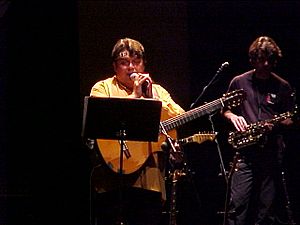Manzanita (singer) facts for kids
José Manuel Ortega Heredia (born in Madrid, 7 February 1956 – died in Alhaurín de la Torre, Málaga, 5 December 2004) was a famous Spanish singer and guitarist. He was known by his stage name, Manzanita. He created a unique musical style that blended flamenco with other sounds.
Contents
Manzanita's Early Music Career
In 1978, Manzanita released his first solo album. It was called Poco ruido y mucho duende. This album showed off his special style. A song from this album, Verde, became very popular. It was based on a poem by the famous writer Lorca.
Two years later, in 1980, he released his second album. This one was named Espíritu sin nombre. Manzanita continued to develop his unique sound.
Big Success and New Sounds
Manzanita's third album, Talco y bronce, came out in 1981. This album was a huge hit in Spain. It sold over half a million copies! Two songs from this album, Un ramito de violetas and Por tu ausencia, became very well-known.
He then released more successful albums. These included Cuando la noche te envuelve (1982), La quiero a morir (1983), and Mal de amores (1984).
In 1986, Manzanita released Echando sentencias. This album was special because it used instruments from Arab and Indian music. This showed how he liked to mix different cultures in his songs.
His 1988 album, En voz baja a las rosas, featured songs based on poems. He adapted works by famous poets like Sor Juana Ines de la Cruz, Góngora, and Lorca.
Later Albums and Return to Music
In 1993, Manzanita released an album called Quédate con Cristo. This album showed his personal faith. After this, he took a break from recording new music for a while. During this time, he mostly sang for his church.
He made a big return to music in 1998. He released a live album, also called Por tu ausencia. It included his greatest hits and some new songs. This album quickly became a gold record, meaning it sold many copies.
In 1999, he had another gold record success. This was for the soundtrack of the movie Sobreviviré. He continued to create popular music.
In 2000, his album Dímelo also earned a gold record. His last album, Gitano cubano, came out in 2002. For this album, he worked with other talented singers. These included Raimundo Amador, Lolita, and Cuban singers Lucrecia and David Montes.
Manzanita passed away in 2004 at his home. He left behind a legacy of unique and beloved music.
Manzanita's Albums
- Poco ruido y mucho duende (CBS, 1978)
- Espíritu sin nombre (CBS, 1980)
- Talco y bronce (CBS, 1981)
- Cuando la noche te envuelve (CBS, 1982)
- La quiero a morir (CBS, 1983)
- Mal de amores (CBS, 1984)
- Echando sentencias (RCA, 1986)
- En voz baja a las rosas (RCA, 1988)
- Quédate con Cristo (Horus, 1993)
- Por tu ausencia (WEA, 1998) live
- Dímelo (WEA, 2000)
- Gitano cubano (WEA, 2002)
- La cucharita (CDI, 2004)
See also
 In Spanish: Manzanita para niños
In Spanish: Manzanita para niños


